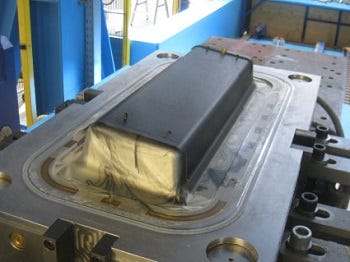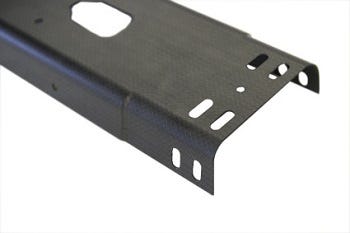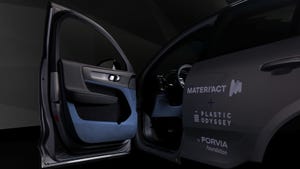A new polyurethane (PU) matrix resin for the resin transfer molding process (RTM) promises to speed up production of composite components in the automotive industry.
June 7, 2013
A new polyurethane (PU) matrix resin for the resin transfer molding process (RTM) promises to speed up production of composite components in the automotive industry. Resin supplier Henkel (Düsseldorf, Germany) worked with machinery supplier KraussMaffei (Munich, Germany) to perfect processing technology employing the PU resin.The outcome of the joint development is curing times of just one minute for a real-life three-dimensional component—a significant advance for fast and efficient volume production of fiber composite components.
|
Unmachined part before demolding. |
|
The component: a lightweight cover section for central consoles, manufactured with carbon fibers from Zoltek and the matrix resin Loctite MAX 2 from Henkel. |
Driven by fuel efficiency targets and the resulting need for lightweight solutions, composite components have become an increasingly important factor in the multi-material designs of modern cars. Offering high strength combined with low weight, glass or carbon fiber-reinforced composite materials are especially suited for the manufacture of motor vehicle components. Particularly for mass-produced automobiles, resin injection processes such as RTM now predominate.
Henkel has pooled its expertise in developing composite matrix resins and in fundamental research on adhesives and surface modification to engineer a complete and coherent system for the manufacture and integration of composite components in the automobile Compared with the epoxy resins normally used for RTM, Loctite MAX 2 reportedly offers a very attractive combination of good mechanical properties and high damage tolerance. For example, tensile modulus is 2800 MPa and tensile strength 80 MPa.
One special feature of the polyurethane matrix resin is its exceptionally high stress intensity factor, which is a measure of toughness. The excellent toughness of the resin also has a positive effect on the fatigue behavior under load. The high tolerance to stress peaks delays the formation of critical cracks, thus prolonging the part life. In automobiles, which are constantly subjected to dynamic loading under driving conditions, materials with a high fatigue tolerance are essential in order to be able to exploit lightweighting potential to its fullest extent.
But material properties are not the only important factors: In the mass-production of automobiles, speed is paramount, and RTM is a process that enables short cycle times to be applied. The extremely low viscosity of Loctite MAX 2, even at low temperatures, permits very fast resin injection without distorting the fibers while also achieving good wetting even with high fiber volumes.
Furthermore, the polyurethane chemistry makes it possible to control the curing reaction more reliably, either by adjusting the temperature or adding an accelerator. The generally low heat generation during curing allows fast curing even of thick parts with many layers of fibers and reduces the risk of local overheating and resulting defects.
The part molded by Chinese processor Ningbo Huaxiang employed four layers of carbon fiber fabric with density of 300 g/m². The mold temperature was 120℃, the injection time four seconds, the resin injection rate 70 g/s.
The resin is injected into the preheated mold under vacuum and the part is demolded removed after one minute. The fiber volume was approximately 50 percent, with no fiber distortion being detected regardless of the laminate structure. Milling to the final shape was performed directly after cooling of the components.
Even though high-pressure polyurethane processing and high-pressure RTM are already state of the art, the machine technology does require some adaptation for the polyurethane RTM process. Building on Henkel's processing expertise, KraussMaffei's engineers further optimized the proven mixing and dispensing stations and the mixing heads in order to improve the high-precision dispensing technology and thus the controllability in high temperature processes.
The results can be seen on the part itself. Excellent mixing of the resin components under high pressure ensures homogeneous product properties without any air pockets. As a result, suitable and proven systems are now available for mass-production.
However, no application solution for the automotive industry is ever complete if it cannot be integrated into an overall package. Henkel therefore offers individually formulated adhesives to ensure reliable integration of the different component materials in modern multi-material designs.
The polyurethane-based matrix resin technology Loctite MAX 2 reportedly offers a very attractive properties profile tuned to the requirements of the automotive industry. Good handling capability in the RTM process combined with low injection viscosity and controllable cure speed permits short cycle times (< 5 min) in composite component manufacture. The excellent intrinsic toughness of the resin results in higher resistance to dynamic loading and greater fatigue tolerance.
Combining Loctite MAX 2 with glass or carbon fibers opens up new opportunities for cost-efficient mass production of lightweight components in the automotive industry. The first applications are already in the commercialization phase.
About the Author(s)
You May Also Like




